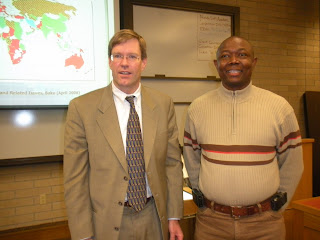

Two of America's leading natural resources lawyers,
Steve Bain and
Bob Bassett, spoke recently about the differences and similarities in the fields of international mining law and international oil and gas law to a large group of
University of Denver Sturm College of Law students in the
Environmental and Natural Resources Law program.
The event, which was sponsored by the
Rocky Mountain Mineral Law Foundation (RMMLF) and organized by law student
Carrie Golden, attracted a group of DU law students from the U.S. as well as Canada, Chile, China, Japan, Nigeria, and Peru, thus reflecting the widely diverse nature of the ENRL student body.
Mr. Bain, a shareholder at
Welborn Sullivan Meck & Tooley, teaches
International and Comparative Petroleum Law & Policy. He noted that mining law is in many respects "more regulated" than oil and gas law largely because mining has been going on for hundreds of years while the exploration for and extraction of oil and gas is a much more recent development. On the other hand he noted that oil and gas development takes place worldwide while mining development generally happens in more confined regions of the world.
Mr. Bassett, manager of the Minerals Practice Group at
Holland & Hart, teaches
International Mining Law & Policy. Before beginning his presentation, Mr. Bassett encouraged students to become familiar with the RMMLF. "The Foundation is widely recognized as the source for lawyers to learn from scholarly works written by practicing lawyers. The Foundation is an invaluable resource." He also noted that individuals involved with the Foundation "build relationships with others. Knowing other practitioners is very important."
Mr. Bassett said that mining dates back to the Roman Empire and Greece. "Many of the concepts first established by the Greeks are still used today," he said. He also noted the capital intensive nature of building mines and the relatively small profit margin that exists in many mining projects.
The two men also made other key observations on various related topics:
- Sustainable Development: Mr. Bassett said the first time he heard about the concept of "sustainable development" was in the context of mining. Now he said an important issue for mining companies is "how can a mining project be designed to be 'sustainable' from an economic perspective. In other words, how can a local community's economy be made to continue on after a mining project is closed." Mr. Bassett noted that mining projects can, and have in many instances (e.g., in Australia, Canada, and the U.S.) provided revenues for government that can then be invested in other sectors, such as education.
- The "Impact" of Development: Mr. Bain noted that mining projects are much more visible to people, and thus often attract more opposition than oil and gas projects. He also pointed out that the "return on investment" for oil and gas projects tends to be considerably higher than for mining projects as a result of the considerable capital investments that must be made in the development stage of mining.
Don C. Smith, director of the ENRL program, said, "Adjunct Professors Bain and Bassett provided a fascinating look at the issues that are uppermost in the minds of oil and gas and mining developers. Everyone attending the event as well as all the students who have studied under these gentlemen has benefited enormously from their insight and experience. The College of Law is privileged to have a strong relationship with both Mr. Bain and Mr. Bassett."
Mr. Smith also noted the longtime relationship between the College of Law and the RMMLF. "The College of Law was one of the founding members of the RMMLF and remains active in the Foundation today.
Professor Jan Laitos is the College of Law's trustee to the Foundation and
Professor and Academic Dean Fred Cheever is a trustee at large," he said.
Editor's Note: Steve Bain is shown alongside student
Alphonsus Ihuoma in the top photo; Bob Bassett is shown in the second photo.
 Mochamad Kasmali, an Indonesian lawyer and 2009 LLM graduate from the University of Denver Sturm College of Law, has rejoined the Jakarta, Indonesia-based firm of Soemadipradja & Taher as a senior associate.
Mochamad Kasmali, an Indonesian lawyer and 2009 LLM graduate from the University of Denver Sturm College of Law, has rejoined the Jakarta, Indonesia-based firm of Soemadipradja & Taher as a senior associate.




